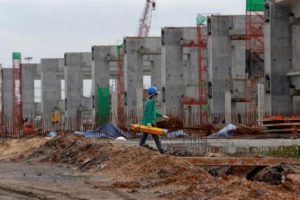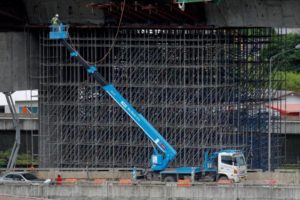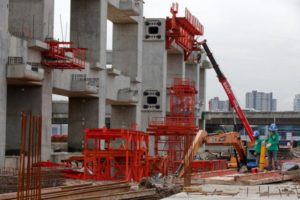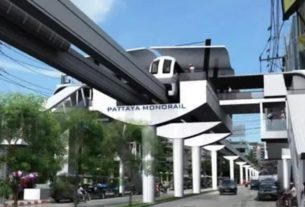
Thailand’s military government aims to jolt its underperforming economy into action with $40 billion of big-ticket investment projects – but so far nearly all the plans remain just that, with less than 1 percent of the amount spent.
One example is a jointly-built Thai-Chinese rail line. It has gone nowhere after 13 bilateral meetings due to disagreements over cost, financing and land rights. Thailand now says it intends to start the project by itself.
The junta has approved a majority of 20 proposed big-ticket projects it aims to build by 2022, which the transport minister estimated will cost 1.41 trillion baht ($40.63 billion). But it had only disbursed 11.3 billion baht, 0.8 percent of the total, by Aug. 19.
There’s a risk Thailand “would not be able to implement all the large public infrastructure plans,” said Kiatipong Ariyapruchya, a World Bank economist.
The World Bank said factors behind delays include an unclear appraisal process, slow procurement and lengthy environmental impact assessment and approval.

Thailand’s infrastructure ranking in the World Economic Forum’s Global Competitiveness Index fell to 44 in 2015-2016 from 38 in 2006-2007. Indonesia climbed to 62 from 89 during the same period.
In the first half of 2016, Thailand’s growth rate inched up, helped by higher government investment. But with exports and domestic consumption both weak, getting stronger growth rates requires both bigger state and private investment.
Private investment has fallen the past three years. Finance Minister Apisak Tantivorawong said recently that without private investment, recovery “will be slow”.
POLITICAL UNCERTAINTY
Keeping down investment has been uncertainty about Thailand’s political path ahead, though the junta has said there will be elections in late 2017.
“Politics have partly kept investment at low levels because investors may want to see the next government first,” Bank of Thailand Governor Veerathai Santiprabhob told Reuters in July.

The central bank has held interest rates near the record low for more than a year, waiting for fiscal policy to shoulder some of the load of lifting the economy.
Public investment jumped nearly 30 percent to a record 865 billion baht last year, after falling 7.3 percent in 2014.
Euben Paracuelles, Nomura economist in Singapore, said second-half growth should be “weak or slower” than the first half because the pace at which the government speeds spending on large projects “is probably not going to be enough to keep headline GDP rising”.
“Hopefully the disbursement will accelerate,” he said.
The Bank of Thailand predicts 2016 GDP growth of 3.1 percent, with exports falling for the fourth year. The World Bank sees 2.5 percent GDP growth. The economy grew 2.8 percent last year.
OPTIMISM ABOUT 2017

Transport Minister Arkhom Termpittayapaisith is optimistic, saying infrastructure projects will lift growth to a four-year high of 3.5 percent this year, and to 3.5-4.5 percent in 2017.
“The benefits will be higher in 2017 as projects bid this year will start next year,” he said.
The central bank governor expects higher disbursements for larger investment projects in the second half of this year as some, such as motorways, have now gone to auction.
Sangvorn Lipatapanlop, managing director of contractor Prayoonwitt Co, which has some highway work, said that once the auctions were held, it can take around three to four months to complete contract negotiations, and then a further two months for the government to release funding.
Even if there’s not much money spent on large-scale projects the rest of this year, economist Pimonwan Mahujchariyawong of Kasikorn Research Center said people will have some confidence as auction processes get under way.
“Just opening bids for them would already make people happy,” she said.
($1 = 34.7 baht)
Source: http://www.reuters.com/article/us-thailand-economy-infrastructure-idUSKCN11D2SZ

